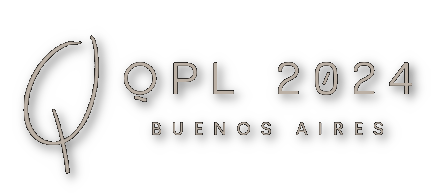QPL Code of Conduct
Please make this conference a welcoming space for everyone. We ask you to use your real name when logging into any of our systems. Our conference is dedicated to providing a harassment-free conference experience for everyone, regardless of gender, gender identity and expression, age, sexual orientation, disability, physical appearance, body size, race, ethnicity, religion (or lack thereof), or scientific opinion. We do not tolerate harassment of community members in any form.
All communication should be appropriate for a professional audience including people of many different backgrounds. Sexual language and imagery is not appropriate for any venue this conference will be held in, whether physical or virtual. If you are being harassed, notice that someone else is being harassed, or have any other concerns, please contact a member of conference staff immediately. If a participant engages in harassing behaviour, the conference organisers may take any action they deem appropriate, including warning the offender or expulsion from the conference.
The dedicated safety and inclusion team will oversee reports of Code of Conduct violation. The team can be contacted at qpl.safety.inclusion@gmail.com , and its members are:
- Federico Holik (CONICET & UNLP)
- Ana Belén Sainz (ICTQT, University of Gdańsk)
- Offensive comments related to gender, gender identity and expression, sexual orientation, disability, physical appearance, body size, race, age, religion, or technology choices;
- Sexual language and images in any workshop platform;
- Deliberate intimidation, stalking, or following;
- Harassing photography or recording;
- Sustained disruption of talks or other events;
- Inappropriate sexual attention;
- Advocating for, or encouraging, any of the above behaviour.
Institutional policy
The venue where the Congress will take place operates within the scope of the Facultad de Ciencias Exactas y Naturales of the Universidad de Buenos Aires. This institution has the Secretariat for the Promotion of Equity and Gender (SeQuiGen), whose mission is to generate actions that foster an institutional culture based on respect, equal opportunities, equity, physical, communicational and cognitive accessibility, the construction of violence-free spaces, the incorporation of gender perspective in institutional policies, and the respect and free development of all individuals in their diversity in all areas, decisions, and actions of the Faculty.
Among SeQuiGen's programs is =GenEx - Gender Equality Program, whose objectives are to promote gender perspective in institutional practices and policies and to provide advice on situations of violence and/or discrimination based on gender, sexual orientation, or gender identity, and to intervene within the framework of the "Institutional Action Protocol for the Prevention and Intervention in Situations of Gender or Sexual Orientation Violence or Discrimination" of the Universidad de Buenos Aires (hereinafter, UBA Protocol).
What is the UBA Protocol?
It is a regulatory framework that governs institutional intervention in cases of harassment, sexual violence, and/or discrimination based on gender, sexual orientation, gender identity, and gender expression.
Who does it involve?
The protocol applies to all labor and/or educational relationships that take place within any unit of the Universidad de Buenos Aires and involves behaviors and actions carried out by:
- Officials, teachers, and non-teaching staff, regardless of their employment status.
- Students, regardless of their academic situation.
- Temporary or visiting academic staff.
- Third parties providing permanent or temporary non-academic services on the premises.
What situations does it cover?
The protocol covers situations that occur within the physical premises of the Universidad de Buenos Aires and/or outside its facilities (through telephone, virtual, and other means contextualized within labor and/or educational relationships) and involve:
- Acts of sexist connotation: behaviors, actions, comments that discriminate, exclude, subordinate, undervalue, or stereotype individuals based on their gender, gender identity, or sexual orientation.
- Acts constituting forms of sexual harassment: repeated comments or behaviors with sexual connotations that involve harassment, coercion, aimed at inducing another person to agree to unwanted or non-consensual sexual requests.
- Acts of sexual violence: any conduct that violates a person's right to decide voluntarily about their sexual life, through deceit, threat, coercion, the use of force, or any form of intimidation.
SeQuiGen's work is complemented by two programs for undergraduate and postgraduate students, teachers and/or researchers, non-teaching staff, and visitors to the Faculty, whose general objectives are:
- ASE - Socio-educational Approaches Program: advising and/or accompanying situations that hinder occupational trajectories and socio-affective relationships, especially related to Mental Health and Violence issues.
- Sin Barreras - Program for the Inclusion of People with Disabilities: working towards the elimination or minimization of barriers that restrict or deny access to people with disabilities in the Faculty environment.
More information: https://exactas.uba.ar/equidadygeneros/
